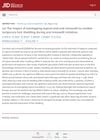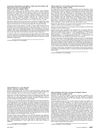January 2022 in “Clinical Cases in Dermatology” Early treatment of traction alopecia can reverse hair loss; prevention involves avoiding tight hairstyles.
[object Object] January 2022 in “Clinical Cases in Dermatology” Chemotherapy can cause significant but usually reversible hair loss, and managing it involves patient education and hair care strategies.
 July 2024 in “The journal of investigative dermatology/Journal of investigative dermatology”
July 2024 in “The journal of investigative dermatology/Journal of investigative dermatology” Using both topical and oral minoxidil does not reduce hair shedding.
1 citations,
May 2022 in “Journal of Drugs in Dermatology” Low-dose naltrexone and platelet-rich plasma can regrow hair in lichen planopilaris.
 5 citations,
February 2014 in “PubMed”
5 citations,
February 2014 in “PubMed” Hair loss in Telogen effluvium is often chronic, linked to stress, and lacks a confirmed treatment, but topical corticosteroids may be used.
 75 citations,
October 1996 in “Dermatologic Clinics”
75 citations,
October 1996 in “Dermatologic Clinics” Chronic Telogen Effluvium is a hair loss condition in middle-aged women that usually doesn't lead to complete baldness.
 24 citations,
September 1985 in “Journal of The American Academy of Dermatology”
24 citations,
September 1985 in “Journal of The American Academy of Dermatology” The report suggests a possible link between hair loss and hidden scalp tumors but states more evidence is needed to confirm this.
January 2022 in “Clinical Cases in Dermatology” A 22-year-old man has alopecia areata, an autoimmune hair loss condition, with various treatments available.
 December 2016 in “Springer eBooks”
December 2016 in “Springer eBooks” A 45-year-old woman with autoimmune diseases experienced patchy hair loss due to alopecia areata, which has no cure but can be treated, with varying success.
 April 2024 in “International journal of medical science and clinical research studies”
April 2024 in “International journal of medical science and clinical research studies” Effective acne management in PCOS includes hormone therapy, metformin, isotretinoin, weight loss, diet, exercise, and personalized treatment plans.
 October 2024 in “Journal of Drugs in Dermatology”
October 2024 in “Journal of Drugs in Dermatology” Combining finasteride with minoxidil is more effective for male hair loss than using minoxidil alone.
December 2021 in “International Journal of Research in Dermatology” Early diagnosis and personalized treatment are crucial for managing hair loss in India.
2 citations,
March 2022 in “Journal of Cosmetic Dermatology” Topical finasteride is a safe and effective treatment for pattern hair loss with fewer side effects than oral finasteride.
 September 2023 in “Journal of Cosmetic Dermatology”
September 2023 in “Journal of Cosmetic Dermatology” Topical cetirizine may help increase hair length in male pattern baldness and could be an alternative to minoxidil with fewer side effects.
 143 citations,
September 1991 in “Archives of Dermatology”
143 citations,
September 1991 in “Archives of Dermatology” Generalized pustular psoriasis patients often need strong medication and careful treatment due to flare-ups and complications.
 6 citations,
September 1990 in “International Journal of Gynecology & Obstetrics”
6 citations,
September 1990 in “International Journal of Gynecology & Obstetrics” The skin condition PUPP usually gets better on its own after giving birth and is unlikely to happen again in future pregnancies.
 August 2018 in “Journal of the American Academy of Dermatology”
August 2018 in “Journal of the American Academy of Dermatology” Calcipotriol may effectively treat hair loss in alopecia areata, working better in children than adults.
December 2018 in “International journal of women’s dermatology” Early diagnosis and strong corticosteroids are crucial for managing lymphocytic cicatricial alopecia.
5 citations,
April 2016 in “PubMed” Cetuximab often causes skin problems, but they can be managed without stopping treatment.
 3 citations,
January 2019 in “Annals of dermatology/Annals of Dermatology”
3 citations,
January 2019 in “Annals of dermatology/Annals of Dermatology” Hydroxychloroquine effectively treated twenty-nail dystrophy in a patient with alopecia areata.
11 citations,
October 2021 in “Journal of The European Academy of Dermatology and Venereology” Topical finasteride is an effective and safer treatment for male hair loss.
17 citations,
November 2021 in “Journal of Cosmetic Dermatology” Combination therapies for androgenetic alopecia work best but can have significant side effects and costs.
 March 2012 in “Journal of The American Academy of Dermatology”
March 2012 in “Journal of The American Academy of Dermatology” Dermoscopy helps diagnose different hair loss conditions, and characteristics vary among ethnicities and individual cases.
[object Object]  April 2012 in “Journal of the American Academy of Dermatology”
April 2012 in “Journal of the American Academy of Dermatology” Clofazimine may be effective for treating ashy dermatosis.
11 citations,
January 2012 in “PubMed” Bimatoprost can help grow eyebrow hair.
3 citations,
January 2020 in “International journal of trichology” Congenital triangular alopecia is a hair loss condition present from birth or early childhood with no effective treatment needed.
69 citations,
March 2016 in “American journal of clinical dermatology” Topical retinoids effectively improve photodamaged skin.
October 2020 in “El-Minia Medical Bulletin” Minoxidil effectively treats hair loss in both men and women.
January 2021 in “Medical research archives” The 5% minoxidil lotion without propylene glycol is effective, well-tolerated, and cosmetically acceptable for hair loss.
2 citations,
February 2021 in “Case reports in dermatological medicine” The new topical botanical formulation significantly regrew hair in all five patients without side effects.













